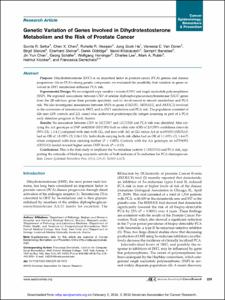KUMEL Repository
1. Journal Papers (연구논문)
1. School of Medicine (의과대학)
Dept. of Laboratory Medicine (진단검사의학)
Genetic Variation of Genes Involved in Dihydrotestosterone Metabolism and the Risk of Prostate Cancer
- Keimyung Author(s)
- Ha, Jung Sook
- Department
- Dept. of Laboratory Medicine (진단검사의학)
- Journal Title
- Cancer Epidemiology, Biomarkers & Prevention
- Issued Date
- 2010
- Volume
- 19
- Issue
- 1
- Abstract
- Purpose: Dihydrotestosterone (DHT) is an important factor in prostate cancer (PCA) genesis and disease progression. Given PCA's strong genetic component, we evaluated the possibility that variation in genes involved in DHT metabolism influence PCA risk.
Experimental Design: We investigated copy number variants (CNV) and single nucleotide polymorphisms (SNP). We explored associations between CNV of uridine diphospho-glucuronosyltransferase (UGT) genes from the 2B subclass, given their prostate specificity and/or involvement in steroid metabolism and PCA risk. We also investigated associations between SNPs in genes (HSD3B1, SRD5A1/2, and AKR1C2) involved in the conversion of testosterone to DHT, and in DHT metabolism and PCA risk. The population consisted of 426 men (205 controls and 221 cases) who underwent prostate-specific antigen screening as part of a PCA early detection program in Tyrol, Austria.
Results: No association between CNV in UGT2B17 and UGT2B28 and PCA risk was identified. Men carrying the AA genotype at SNP rs6428830 (HSD3B1) had an odds ratio (OR) of 2.0 [95% confidence intervals (95% CI), 1.1-4.1] compared with men with GG, and men with AG or GG versus AA in rs1691053 (SRD5A1) had an OR of 1.8 (95% CI, 1.04-3.13). Individuals carrying both risk alleles had an OR of 3.1 (95% CI, 1.4-6.7) when compared with men carrying neither (P = 0.005). Controls with the AA genotype on rs7594951 (SRD5A2) tended toward higher serum DHT levels (P = 0.03).
Conclusions: This is the first study to implicate the 5α-reductase isoform 1 (SRD5A1) and PCA risk, supporting the rationale of blocking enzymatic activity of both isoforms of 5α-reductase for PCA chemoprevention.
- Keimyung Author(s)(Kor)
- 하정숙
- Publisher
- School of Medicine
- Citation
- Sunita R. Setlur et al. (2010). Genetic Variation of Genes Involved in Dihydrotestosterone Metabolism and the Risk of Prostate Cancer. Cancer Epidemiology, Biomarkers & Prevention, 19(1), 229–239. doi: 10.1158/1055-9965.EPI-09-1018
- Type
- Article
- ISSN
- 1055-9965
- Appears in Collections:
- 1. School of Medicine (의과대학) > Dept. of Laboratory Medicine (진단검사의학)
- 파일 목록
-
-
Download
 oak-aaa-00768.pdf
기타 데이터 / 589.11 kB / Adobe PDF
oak-aaa-00768.pdf
기타 데이터 / 589.11 kB / Adobe PDF
-
Items in Repository are protected by copyright, with all rights reserved, unless otherwise indicated.